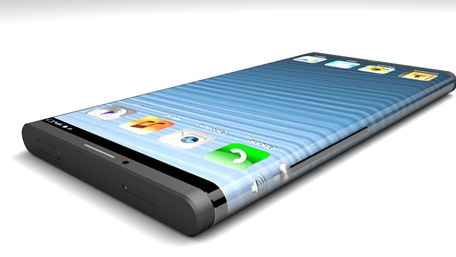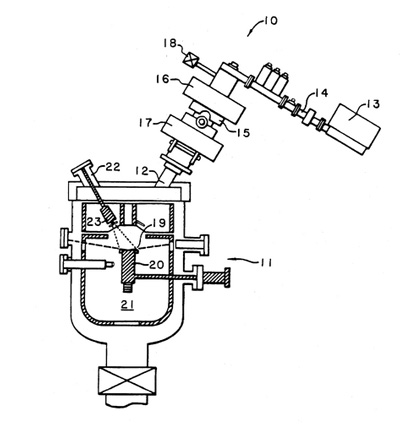- City Fajr Shuruq Duhr Asr Magrib Isha
- Dubai 04:20 05:42 12:28 15:53 19:08 20:30

iPhone 6 curved screen concept
Boston University has sued Apple Inc. (NASDAQ:AAPL) for patent infringement, and has sought a ban on its spearhead devices including but not limited to the iPhone 5, iPad and MacBook Air.
Trustees of the distinguished academic institution have alleged, in a complaint filed this week in the Massachusetts federal court, that Apple Inc.’s products contain a “gallium nitride thin film semiconductor device” that is still under patent protection.
The thin film semiconductor device in question is what powers the LEDs in the iPhones, iPads and MacBook Airs. What’s more, Apple Inc.’s next-generation iPhone 6 is widely expected to include a dual-LED flash (as compared to single LED flashes in the current-generation iPhone 5), which has the potential to dramatically improve low-light photographs shot with the iPhone 6.

At least that was what Apple fans were hoping for. That hope, however, seems to be stalled now that Boston U has sought an injunction against the sale of all Apple devices that use the so-called gallium nitride thin-film semiconductor device.
In court papers seen by Emirates 24|7, the university has demanded a trial by a jury. In addition, BU has requested the court to “permanently enjoin defendant and all those in privity with defendant from making, having made, selling, offering for sale, distributing and/or using products that infringe the ’738 patent, including the accused products.”
Boston University’s Professor of Electrical and Computer Engineering Theodore D. Moustakas, Ph.D., had applied for the patent in 1995, and was granted the same in 1997. “The university owns by assignment the entire right, title, and interest in and to the ’738 patent, including the sole right to sue for past and present patent infringements thereof,” the university states in the complaint.

BU patent
Considering that patents, usually, have a 20-year lifespan in the US, this means that it is set to expire latest by 2017. The patent describes the use of nitrogen to prepare a type of film that is “a potential source of inexpensive and compact solid-state blue lasers,” or LEDs.
The university has sought for unspecified damages (“adequate to compensate”) for the “wrongful infringement”, and has asked for the court to direct Apple Inc. to hand it over “an accounting of all gains, profits and advantages derived” as a result of the patent infringement.
In simpler terms, the legal terminology means that Boston University wants Apple’s current and forthcoming spearhead devices banned permanently, plus it wants a share of the profits that Apple Inc. and its agents (distributors, resellers, etc.) might have made on the back of the alleged infringement.
While it is obviously for the court to decide on the merit of the case, we’re wondering what took Boston University so long to file its complaint against the alleged patent infringement by Apple Inc.
The first iPhone was launched in 2007, and it sported the same blue-laser light that the current iteration of iPhone sports. And doesn’t every smartphone today use that “gallium nitride thin film semiconductor device”, or is Apple Inc. exclusively (allegedly) infringing on that patent?
Court papers filed by the university maintain that it is one of the largest private universities in the US, and one of the largest employers in Boston, with more than 10,000 faculty and staff and over 33,000 students. It endowments totalled more than $1.1 billion as of June 30, 2012 (this year’s numbers are yet to be made public).
“It conducts a diverse range of interdisciplinary, collaborative and innovative research projects across a broad spectrum of academic departments, programs, centres and institutes, including research in the field of electrical and computer engineering. BU faculty members have won five Nobel Prizes and BU has been awarded hundreds of US Patents,” it states, and that includes the patent that it alleges to have been infringed by Apple Inc.’s devices.
In addition, Boston University is a non-profit educational institution, which would suggest that it isn’t overly interested in making money from of its knowledge-dissemination venture. Then why is it seeking a part of Apple Inc.’s – and its agents’ – profits for a number of past years, and why is it seeking a ban on the devices?
In the end, that question might end up being of academic interest (pun intended) if Apple Inc. and Boston University settle the dispute amicably and out-of-court. Or Apple could come out with its own sets of patents to prove that what it uses is patented by the Cupertino-based giant and not the University.
Either way, a complete and permanent ban on iPhone 5, iPhone 6, iPad 4 and the MacBook Air, among others, sounds harsh but since the matter is now in courts, we’ll need to wait and see how, if at all, this impacts Apple’s future devices.
![]() Follow Emirates 24|7 on Google News.
Follow Emirates 24|7 on Google News.